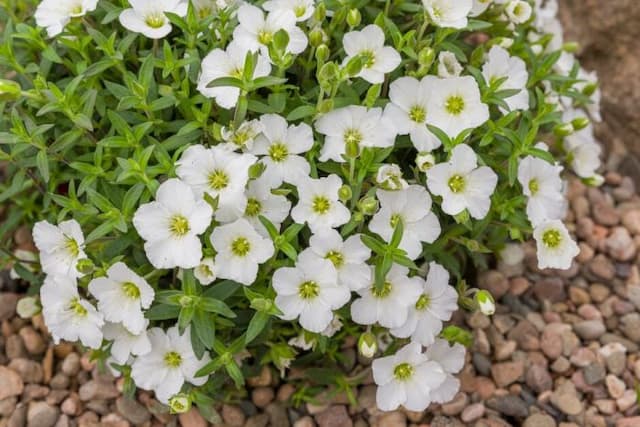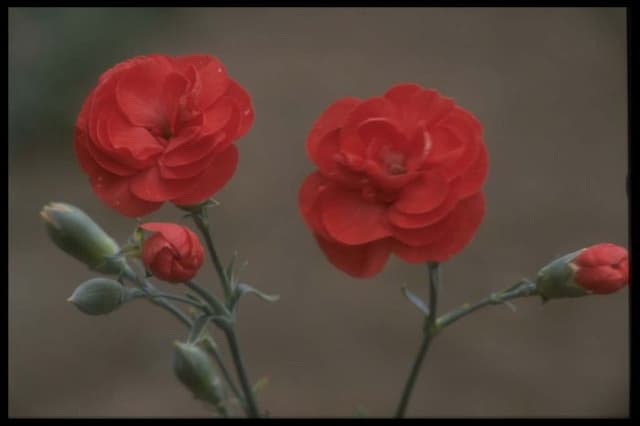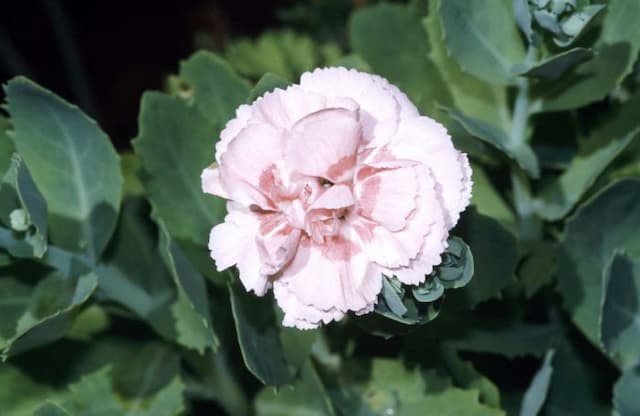Pinks Dianthus 'Evening Star' (p)

ABOUT
The Evening Star, a variety of Dianthus, boasts a burst of vibrant colors and a distinctive form that makes it a standout in any garden space. This plant typically displays a rich palette of deep, velvety hues, often in pinks, purples, and sometimes whites, which can be adorned with striking patterns or varying shades. Petals are commonly edged with a contrasting color, providing a stunning, almost hand-painted appearance. The flowers of the Evening Star Dianthus are known for their frilled or serrated edges, which give them a ruffled and textured look, adding to their visual appeal. They exude a spicy, clove-like fragrance that intensifies on warm, sunny days, providing an olfactory as well as visual feast. These blossoms are usually grouped together in clusters, forming a colorful bouquet on the plant itself which is particularly attractive to pollinators such as bees and butterflies. The foliage of the Evening Star forms a dense clump, with slender, linear leaves. These leaves often have a blue-green or gray-green color, which beautifully complements the vivid tones of the flowers. The sturdy stems that bear the flowers are strong enough to hold them aloft, allowing them to sway gently in the breeze while still maintaining their upright stature. Though varying in appearance across different cultivars, the Evening Star Dianthus combines its flamboyant blooms with a robust and hardy nature, which makes it not only a feast for the eyes but also a reliable performer in a variety of garden settings. This plant can offer lasting color and fragrance throughout its blooming period, making it a cherished addition to both formal and casual landscapes.
About this plant
 Names
NamesFamily
Caryophyllaceae
Synonyms
Pink, Carnation, Sweet William
Common names
Dianthus 'Evening Star'.
 Toxicity
ToxicityTo humans
Dianthus 'Evening Star', commonly known as Pinks, is generally not considered toxic to humans. While ingestion may cause mild gastrointestinal irritation in some sensitive individuals, it is not known for causing serious poisoning or life-threatening symptoms.
To pets
Pinks are not listed as toxic to pets. However, as with any plant, ingestion can sometimes result in mild gastrointestinal upset such as vomiting or diarrhea in some animals. If your pet displays symptoms after ingesting this plant, it is best to consult a veterinarian.
 Characteristics
CharacteristicsLife cycle
Perennials
Foliage type
Evergreen
Color of leaves
Blue-green
Flower color
Pink
Height
1 foot [30 cm]
Spread
1 foot [30 cm]
Plant type
Herb
Hardiness zones
3
Native area
Europe
Benefits
 General Benefits
General Benefits- Aesthetic Appeal: The Dianthus 'Evening Star' adds vibrant color and visual interest to gardens and landscapes with its striking magenta flowers and silvery-green foliage.
- Fragrance: This plant is known for its spicy clove-scented flowers, which can add a delightful aroma to the garden environment.
- Pollinator Friendly: It attracts butterflies and bees, supporting local ecosystems and pollinator populations.
- Long Blooming Period: With proper care, the Dianthus 'Evening Star' can have a long flowering season, providing extended enjoyment throughout its bloom time.
- Drought Tolerance: Once established, it can be quite drought-tolerant, making it suitable for gardens in drier climates.
- Low Maintenance: It typically requires minimal care, making it an excellent choice for gardeners of all skill levels.
- Edging and Borders: The compact growth habit of Dianthus makes it an ideal plant for edging and creating borders in garden beds.
- Container Gardening: It is well-suited for container planting, allowing for garden accents on patios, balconies, or other areas with limited space.
- Deer Resistance: The plant is generally resistant to browsing by deer, protecting them from wildlife damage in areas with deer populations.
 Medical Properties
Medical PropertiesThis plant is not used for medical purposes.
 Air-purifying Qualities
Air-purifying QualitiesThis plant is not specifically known for air purifying qualities.
 Other Uses
Other Uses- Dianthus 'Evening Star', also known as Sweet William, can be used to create vibrant and fragrant natural dyes for fabrics, giving textiles an organic and unique coloring.
- The crushed petals of Sweet William are sometimes added to ink formulations, providing a subtle fragrance and a hint of color to handmade inks used for writing or artistic purposes.
- Sweet William is often incorporated into potpourris and sachets, not only for its pleasant scent but also for its attractive appearance when dried.
- The flower’s petals can be sprinkled over salads or desserts for an edible garnish that provides a peppery taste, similar to other edible flowers like nasturtiums.
- When frozen into ice cubes, the colorful blossoms of Sweet William add a decorative touch to cold beverages, making them aesthetically pleasing for special occasions.
- In floristry, the long-lasting and firm characteristics of Sweet William make them excellent for creating dried flower arrangements or wreaths that maintain their shape and color.
- Sweet William can be incorporated into floral water mists used in linen or room sprays, offering a refreshing and natural fragrance to living spaces.
- In craft projects, the petals of Sweet William can be used to adorn handmade paper, adding texture and visual interest to the finished product.
- The flowers' distinctive look can inspire creative designs in hobbies such as embroidery, where their pattern and colors can be replicated with thread on fabric.
- Sweet William is sometimes used as a natural pest repellent when planted in gardens, as their scent is believed to deter certain insects.
Interesting Facts
 Feng Shui
Feng ShuiThe Dianthus is not used in Feng Shui practice.
 Zodiac Sign Compitability
Zodiac Sign CompitabilityThe Dianthus is not used in astrology practice.
 Plant Symbolism
Plant Symbolism- Love: The carnation, which is the most common name for Dianthus, often symbolizes love and fascination. The 'Evening Star' variety with its beautiful, often pink flowers, may represent deep romantic love.
- Distinction: With its unique and striking appearance, the 'Evening Star' carnation could also represent distinction or singular beauty.
- Divine Love: Carnations have been used in art and culture to symbolize divine love, particularly the love of a god or the Virgin Mary.
- Pure Love: White variations of the carnation convey pure love and good luck, which may extend to the 'Evening Star' if it features white hues.
- Gratitude: Carnations, in general, are often given as a sign of gratitude. The 'Evening Star' carnation could be used to express appreciation with its elegant presence in a bouquet.
 Water
WaterCarnations, including the Dianthus 'Evening Star', require even moisture to thrive but don't like to be waterlogged. It is important to water them deeply whenever the top inch of soil feels dry to the touch. In general, watering once every 7 to 10 days is sufficient, but this can vary depending on temperature and humidity. Aim to provide the equivalent of 1 gallon of water per square yard each time you water, ensuring that the water penetrates deeply into the soil to encourage strong root development. Always avoid overhead watering to minimize the risk of foliar diseases.
 Light
LightCarnations like the Dianthus 'Evening Star' perform best in full sunlight, which equates to at least 6 hours of direct sun per day. The ideal spot for planting them is in a location where they can receive ample morning sunlight and some protection from the intense late afternoon sun, especially in hotter climates, to prevent the flowers from fading.
 Temperature
TemperatureCarnations, such as the Dianthus 'Evening Star', enjoy cooler temperatures and can generally tolerate a range from 40 to 85 degrees Fahrenheit, with ideal growing temperatures between 60 and 70 degrees Fahrenheit during the day. They can survive light frosts, but temperatures dropping significantly below 40 degrees Fahrenheit can be harmful to the plant.
 Pruning
PruningPruning carnations like the Dianthus 'Evening Star' encourages bushier growth and more flowers. Deadhead spent blooms regularly throughout the growing season to promote continuous flowering. Perform a more thorough pruning in early spring, cutting back stems to within a few inches of the ground to refresh the plant. Make time for pruning after the first flush of blooms has faded to rejuvenate the foliage and encourage a second bloom period.
 Cleaning
CleaningAs needed
 Soil
SoilCarnations like well-draining, loamy soil with a neutral to slightly alkaline pH level of 6.7 to 7.5. A good mix could be composed of one part garden soil, one part well-rotted compost, and one part coarse sand or perlite to ensure proper drainage.
 Repotting
RepottingCarnations typically require repotting every two to three years to refresh the soil and to accommodate root growth. It's best to repot in the spring before new growth begins.
 Humidity & Misting
Humidity & MistingCarnations prefer moderate humidity levels around 40-50%. They can tolerate some deviation from this range, but consistently high humidity may lead to fungal diseases.
 Suitable locations
Suitable locationsIndoor
Place in bright indirect light with ample airflow.
Outdoor
Full sun, well-draining soil, protect from extreme cold.
Hardiness zone
3-9 USDA
 Life cycle
Life cycleDianthus 'Evening Star', commonly known as Pink, begins its life as a seed, which when sown in well-draining soil and with adequate warmth, germinates within a few days to a few weeks. The seedling stage follows germination, where the plant develops its first true leaves and establishes a root system. As it enters the vegetative stage, Pink grows stems and foliage, increasing in size and strength. The transition to the flowering stage occurs when the plant matures and environmental conditions are favorable, typically marked by the development of colorful and fragrant flowers. After pollination, the flowers produce seeds, completing the reproductive cycle. Finally, as a perennial, Pink will enter a period of dormancy during adverse conditions like winter, only to regrow from the same roots in the following growing season.
 Propogation
PropogationPropogation time
Spring-Early Summer
Dianthus 'Evening Star', commonly known as Pinks, is best propagated through stem cuttings during late spring or early summer. Select a healthy stem with several pairs of leaves and cut a 3 to 5 inch (about 7.5 to 12.5 centimeters) length just below a leaf node. Remove the leaves from the lower half of the cutting to prevent decay and dip the cut end in rooting hormone powder to encourage root growth. Plant the cutting in a well-drained soil mix, ensuring at least two sets of leaf nodes are buried beneath the soil surface. Keep the soil moist but not waterlogged and place the cutting in a warm location with indirect sunlight. Roots typically develop within a few weeks, after which the new plant can be gradually acclimatized to outdoor conditions before transplanting to its final location in the garden.



![Pink [Tequila Sunrise]](/_next/image?url=https%3A%2F%2Fplants-admin.emdemapps.com%2Fimages%2Fplants%2F%2Fimages%2F604b5d995d06e.png&w=640&q=75)





